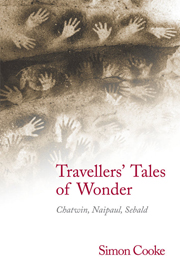Book contents
- Frontmatter
- Contents
- List of Illustrations
- Acknowledgements
- Introduction: The Wonder that Came Later
- I ‘Horizon of expectations’: Travels in Literary History
- 1 A Question of Form: Genre and the Journey
- 2 ‘An End to Journeying’: Travel and its Discontents in Late Modernity
- 3 Forms of Recovery and Renewal: Travels in Contemporary Literature
- II Readings in Contemporary Travellers' Tales of Wonder
- Afterword: The ‘unlimited vicissitudes of travelling’
- Bibliography
- Index
3 - Forms of Recovery and Renewal: Travels in Contemporary Literature
from I - ‘Horizon of expectations’: Travels in Literary History
Published online by Cambridge University Press: 05 October 2013
- Frontmatter
- Contents
- List of Illustrations
- Acknowledgements
- Introduction: The Wonder that Came Later
- I ‘Horizon of expectations’: Travels in Literary History
- 1 A Question of Form: Genre and the Journey
- 2 ‘An End to Journeying’: Travel and its Discontents in Late Modernity
- 3 Forms of Recovery and Renewal: Travels in Contemporary Literature
- II Readings in Contemporary Travellers' Tales of Wonder
- Afterword: The ‘unlimited vicissitudes of travelling’
- Bibliography
- Index
Summary
It might at first appear an irony: the peak in anxieties about the end of travel coincides, almost exactly, with what has been described as the ‘renaissance of the travel book’ (see for example, Graves 2003). But this convergence in the late 1970s and 1980s is more likely an expression of a broad literary and cultural engagement with questions of travel in a world increasingly on the move, increasingly interconnected. The publication of Bruce Chatwin's In Patagonia in 1977, alongside that of Patrick Leigh Fermor's A Time of Gifts, is often given as the literary historical moment in which travel writing was most conspicuously asserted and formally renewed (Hulme and Youngs 2002; Graves 2003; Borm 2007). The work of writers like Paul Theroux, Colin Thubron, Jonathan Raban, Robyn Davidson and Peter Matthiessen further demonstrated the vitality of the form. This reinvigoration of the travel book in Anglophone terms was prominently heralded in a 1984 edition of the influential literary magazine of new writing, Granta, which was dedicated to ‘Travel Writing’, and advertised as follows:
Travel writing is undergoing a revival: not since the 1920s and '30s has it been so popular or important. What accounts for its sudden appeal? A need for escape? Nostalgia for an experience that means not tourism but adventure? Or does travel writing – being part reportage, part fiction, and part meditation – express concerns that we rarely see addressed in other forms of writing?
(Buford 1984: ix)- Type
- Chapter
- Information
- Travellers' Tales of WonderChatwin, Naipaul, Sebald, pp. 45 - 56Publisher: Edinburgh University PressPrint publication year: 2013

